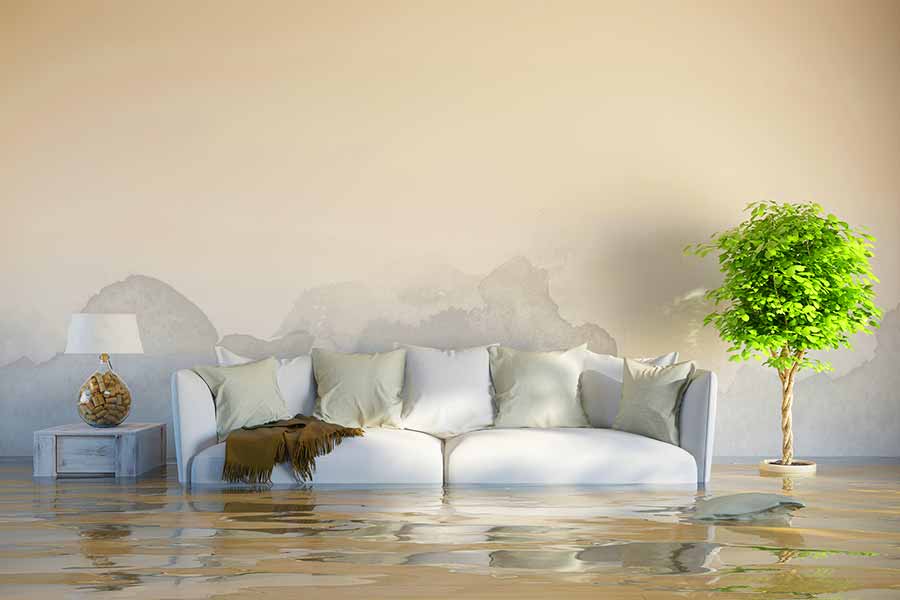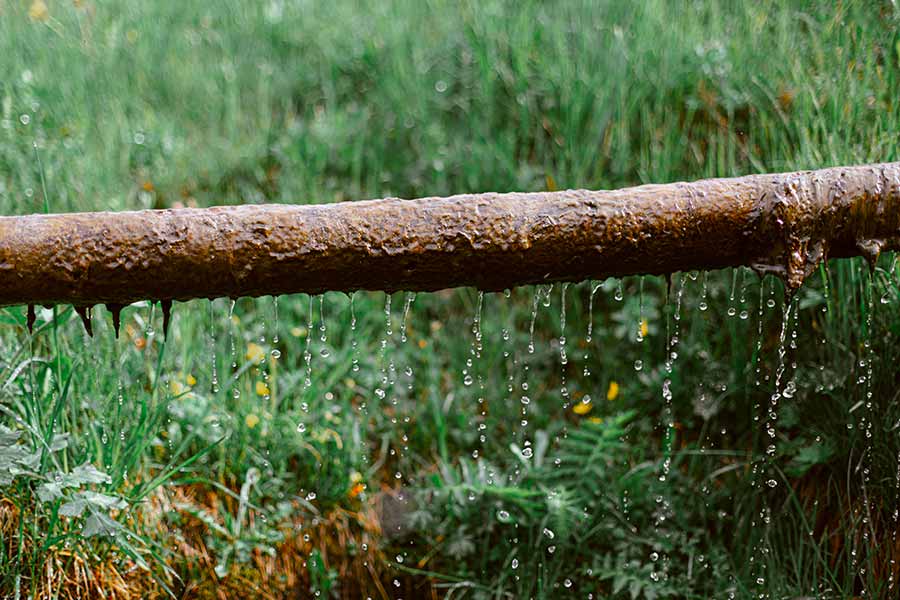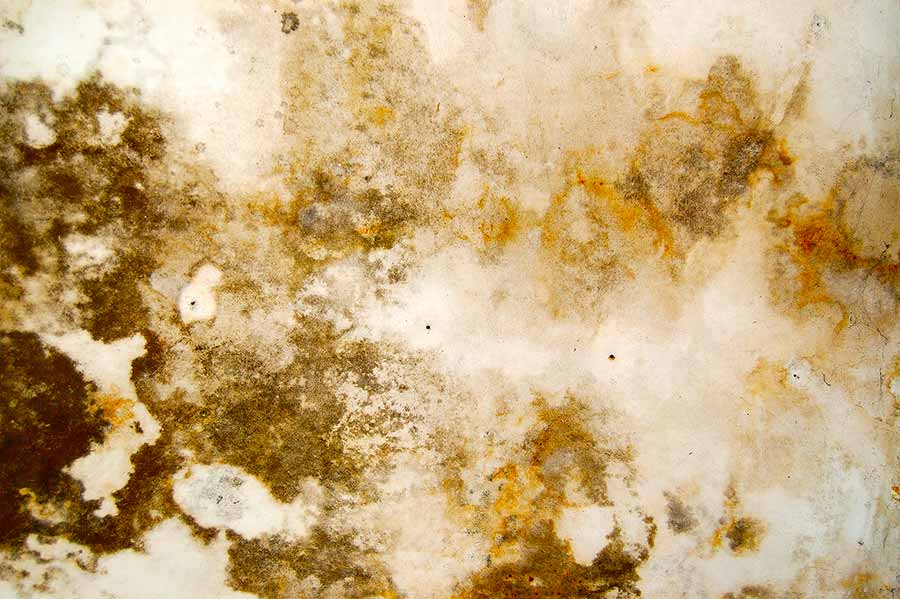Written by Andy Gurczak
October 20, 2021
Water Damage Tips and Tricks
Water can be unpredictable, relentless, and destructive in the wrong circumstances. In short, it’s a powerful element. This becomes alarmingly apparent in the face of a natural disaster. In addition, more common occurrences, such as leaking pipes, burst sewer lines, and snowmelt, can also leave your home severely water damaged. For this reason, you must learn how to deal with water damage as a responsible homeowner. So to help you out, we have compiled a list of water damage tips and tricks.
Suppose your property is affected by water damage. In that case, you must identify the cause and act quickly to avoid further destruction.
What Does Water Damage Affect?
Water is critical to life, but it can also destroy everything in its path and leave you with a huge mess to clean up. As a homeowner, it is important to understand what water can seriously damage within your home. So to be safe, always inspect the following locations for damage:
- Drywall
- Appliances
- Floor coverings
- Plaster
- Insulation
- Wood
- Framing
- Electrical wiring
- Pipes
- HVAC
Water can wreak havoc on your home’s foundation and quickly wrack up a hefty restoration bill if left unattended. Therefore, our most crucial water damage tip to you is that you act swiftly once you become aware of any sort of water damage.
Water Damage Tips
Water Damage Tips #1: First, Get Help.
The first and most important factor when faced with water damage is safety. So align yourself with appropriate local resources and professionals to assist you, including fire and police, mechanical contractors, insurance, utility, and restoration services.
Water Damage Tips #2: Second, Know How to Shut Off Water Sources.
Before any water damage occurs, familiarize yourself with water shut-offs for quick access. Swift action is critical to minimize loss, mitigate risk, and protect assets. So as soon as water damage happens, turn off the water source.
Water Damage Tips #3: And Disconnect Outlets.
The first thing to do when you discover water damage in your home is to unplug all electronics immediately. Although you may not see the severity of the water damage just yet, it’s important to be cautious around appliances and gas lines. Using electrical appliances despite the situation could cause electrical shocks or even explosions. In addition, ensure you are also on the lookout for water coming through light fixtures or electrical boxes.
Water Damage Tips #4: Equally Important, is to Be Able to Identify the Source of the Water Damage.
After shutting off the water supply, assess the degree of contamination to determine a water damage remediation plan. Be aware of the associated health effects depending on contamination level. Therefore, if you are unsure of the contamination level of your home, steer clear of any contact and wait for professional help.
Water Damage Tips #5: Then, Relocate or Protect Valuable Contents.
Clear the water-damaged area of all valuable items, including electronics, computers, furniture, artwork, files and documents, clothing, etc. In addition, have plastic garbage bags to cover valuables, as well as caution tape, duct tape, and basic hand tools.
Water Damage Tips #6: Contain and/or isolate the area(s) of damage
Protect staff and on-site emergency personnel. For example, you could create a plastic barrier around the perimeter of the contaminated area and cord off with caution tape.
Water Damage Tips #7: After, Dry Water Out.
Water damage mitigation is absolutely crucial. Before more damage occurs, you need to remove standing water and dry out the affected areas. Water removal companies use industrial fans or large-capacity dehumidifiers to circulate air and dry out wet carpeting, wood, and surrounding porous materials.
Water Damage Tips #8: As Well As Remove Damaged Materials.
Although it’s possible to dry out porous materials, such as insulation or carpets, you might need to dispose of them immediately if the damage is severe. This is especially important to avoid mold and mildew. Regardless, damage mitigation and restoration should focus on ceilings and floors first. This means unsealed cement, drywall, and wood need to be addressed and replaced in order to protect the home’s structure.
Water Damage Tips #9: Then, Proceed to Disinfect Remaining Areas.
As we mentioned before, depending on the types of water you are dealing with, it can contain many bacteria and other hazardous materials. Moreover, excess moisture could also encourage the growth of mold. For this reason, it is essential to sanitize the water-damaged area immediately. Water damage restoration companies generally spray and wipe down surfaces with bleach and other professional disinfectants, so the mold spores don’t grow.
Water Damage Tips #10: Last But Certainly Not Least, Inspect for Mold.
We can’t stress this enough. Inspecting your home for mold after any type or amount of water damage is of the most importance. Certain mold strains are toxic to humans and pose serious health risks.
Mold can spread quickly once it infests an area, so it is in your best interest to inspect for growth to avoid any health hazards. You can cut out the affected area, bag it, and dispose of it immediately for small issues.
On the other hand, severe mold infestations need serious restoration. For example, any airflow must be shut down immediately to stop contamination. Therefore, only an experienced mold restoration specialist should take care of the job. Often, mold can appear inside the walls or floors, so this inspection must be ongoing throughout the restoration.
Call your Insurance Company
Standard homeowners insurance policy covers water damage, as long as it’s not due to negligence or flooding. For instance, your insurance company is more likely to cover a sudden burst pipe than a slow, gradually leaky pipes. However, don’t hesitate to consult with your insurance agent to ensure your coverage.
Moreover, if you need any help with filing, negotiating, and settling your water damage insurance claim, don’t hesitate to AllCity Public Adjusting. Call AllCity Adjusting for your public adjuster needs today!
Best way to beat the insurance company is to hire AllCity Adjusting
At AllCity Adjusting we help residential and commercial clients alike get the claims support they need. Moreover, we have over 50 years of combined experience helping get our clients the max settlement time and time again. If your claim has been low balled or denied entirely we can help increase your maximum settlement. Call us today for a FREE consultation. Experience the AllCity difference.
Real Support When You Need It!
Related Articles
7 Red Flags That Indicate You Need to Hire a Public Adjuster
If you own property, managing roofing insurance claims might seem tough. Knowing how to quickly deal with roof damage insurance claims from water, weather, fire, or unexpected events is helpful. In this guide, we’ll share useful tips to help you understand and work through roofing insurance claims more easily, aiming for a quicker solution.
Navigating Fire Damage Claims: What Every Property Owner Should Know
If you own property, managing roofing insurance claims might seem tough. Knowing how to quickly deal with roof damage insurance claims from water, weather, fire, or unexpected events is helpful. In this guide, we’ll share useful tips to help you understand and work through roofing insurance claims more easily, aiming for a quicker solution.
The Role of a Public Adjuster in Water Damage Claims
If you own property, managing roofing insurance claims might seem tough. Knowing how to quickly deal with roof damage insurance claims from water, weather, fire, or unexpected events is helpful. In this guide, we’ll share useful tips to help you understand and work through roofing insurance claims more easily, aiming for a quicker solution.
Understanding Water Damage Claims: A Comprehensive Guide for Homeowners
If you own property, managing roofing insurance claims might seem tough. Knowing how to quickly deal with roof damage insurance claims from water, weather, fire, or unexpected events is helpful. In this guide, we’ll share useful tips to help you understand and work through roofing insurance claims more easily, aiming for a quicker solution.
Essential Traits and Skills for a Successful Public Adjuster
If you own property, managing roofing insurance claims might seem tough. Knowing how to quickly deal with roof damage insurance claims from water, weather, fire, or unexpected events is helpful. In this guide, we’ll share useful tips to help you understand and work through roofing insurance claims more easily, aiming for a quicker solution.
Tips Expedite the Process :Commercial Roofing Insurance Claims
If you own property, managing roofing insurance claims might seem tough. Knowing how to quickly deal with roof damage insurance claims from water, weather, fire, or unexpected events is helpful. In this guide, we’ll share useful tips to help you understand and work through roofing insurance claims more easily, aiming for a quicker solution.
Stay Up to Date With The Latest News & Updates
Don't Wait - Get More
Get a free 1 hour consultation on your next call. So call today and challenge the insurance company narrative on your policy claim. We can help you with all your public adjuster claims support. Let us help you get more.
Join Our Newsletter
Do you want to learn more about public adjusting. In this newsletter we create helpful tips and hints and you will receive notifications when we post new articles.
Follow Us
Follow us on the following social networks.









Recent Comments